Top 5 Use Cases of AI in Healthcare: Implementation Strategies and Future Trends

In this article, we will delve into the profound impact of Artificial Intelligence (AI) on the modern healthcare sector in the United States and worldwide. If you are wondering how is AI used in healthcare, we will explore real-world examples of AI in healthcare that showcase the transformative power of cognitive computing while providing insight into practical strategies for healthcare providers to optimize and automate their daily workflows with AI & ML.
AI has emerged as a powerful force for enhancing healthcare institutions, presenting a wide range of AI use cases for healthcare while democratizing accessibility and patient outcomes. The integration of conversational AI, machine learning (ML), medical data mining, and smart devices has paved the way for a new era of healthcare. In this article, we will delve into the remarkable potential of AI technologies, exploring diverse AI ML use cases in healthcare that are shaping the future of the industry.
| ⚠️ If you’re seeking to combine AI with healthcare software, don’t hesitate to schedule a complimentary call or chat with our seasoned IT engineers → |
Today’s healthcare IT market numbers demonstrate that it’s experiencing a saturation of AI-based solutions and innovations. Artificial intelligence is no longer exclusive to large corporations or limited to computer science theorists. It has become increasingly accessible to companies across various industries, including healthcare providers.
As a result, real-life AI use cases in healthcare can now be found even in small medical offices and medical technology startups.
Artificial intelligence platforms have the potential to be seamlessly integrated into your existing business systems, including legacy medical software upgrades, through APIs. However, to fully unlock all the capabilities of AI technology in healthcare, it is advisable to architect and develop medical practice software from the ground up. This approach allows for the tailored implementation of AI features and ensures optimal utilization of AI-driven functionalities in the healthcare domain.
Enhancing your healthcare systems can be easily accomplished by integrating user-friendly, high-level APIs that enable the utilization of AI-powered components. This process is particularly effective when handled by experienced developers.
Here is a visual representation that illustrates how an API facilitates seamless connections between various components within a healthcare system:
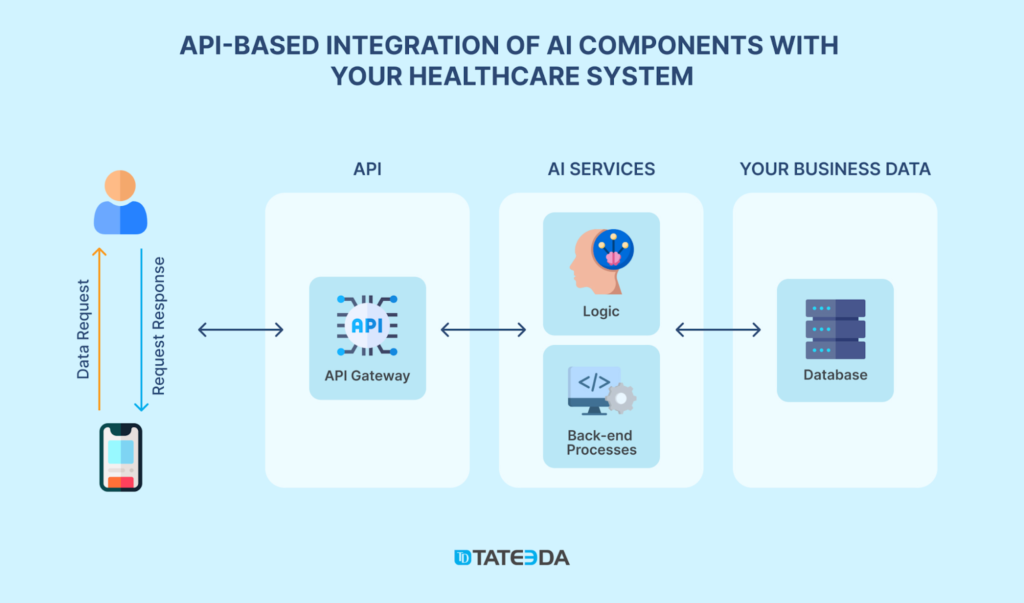
Leading tech vendors such as IBM, AWS, and Google offer pre-trained models capable of processing your data and providing valuable insights without the need for extensive machine-learning expertise. AI APIs provide a range of capabilities, including the following three groups:
- Extract insights from medical text and voice communications: Recognize medical terms, translate documents, and analyze clinical data for improved understanding and decision-making in healthcare settings.
- Analyze medical images and videos: Identify anatomical structures, detect abnormalities, and analyze medical scans to aid in diagnosis, treatment planning, and monitoring of patient progress.
- Specialized healthcare services: Access unique features and functionalities designed specifically for the healthcare industry, such as natural language processing for medical records, medical image analysis algorithms, and predictive modeling for patient outcomes.
Join us as we delve into the remarkable potential of AI in healthcare, a realm that holds the key to staying ahead and delivering exceptional patient care while driving operational efficiencies. In a landscape inundated with information and speculation, we aim to provide concrete examples of AI’s practical applications within the healthcare industry.
Before diving into AI in healthcare use cases, take a moment to familiarize yourself with TATEEDA GLOBAL, including our background and range of services:
| ? Who are we? We understand the challenges physicians and healthcare providers encounter, and we are here to offer our technical support. TATEEDA GLOBAL is a healthcare software development company based in San Diego, California ?? with nearshore and offshore IT engineering capabilities to enhance our price offerings and project costs. We have assisted numerous American and international companies in designing and developing their software solutions. We recognize the importance of artificial intelligence (AI) in healthcare software and its great potential for revolutionizing the sector. Our team of experienced professionals has spent years honing their expertise in innovative health-tech solutions specifically tailored to the medical field. |
Do You Have Medical AI & ML Software Projects in Mind?
We invite you to discuss your ideas with one of our skilled digital health app engineers and get a free estimate.
Table of Contents
The Leading AI Cloud Platforms for Healthcare Solutions
Is it truly feasible for a medical services provider such as a private clinic, community health center, or boutique practitioner, to adopt AI technology? Let’s explore some examples of AI in healthcare, including a list of prominent vendors who are refining their artificial intelligence platforms to make AI and ML services more accessible to a broader range of healthcare providers and companies, including health-tech startups…
| Oracle AI Services | With a focus on data scientists and developers, Oracle Cloud Infrastructure (OCI) AI Services offers chatbots, language processing, speech recognition, computer vision, prediction, and forecasting capabilities. |
| IBM Watson | IBM offers AI-based cognitive services and software as well as scalable cloud-based medical data analytics and AI solutions. Leveraging a robust cloud platform, IBM remains at the forefront of healthcare AI advancements. |
| Microsoft Azure | MS Cognitive Services provides skilled Azure developers with a comprehensive suite of prebuilt SDKs, APIs, and customizable services that encompasses vision, language, speech, decision-making, and search. Additionally, Microsoft Azure offers robust machine-learning frameworks and tools. |
| Google Cloud AI | Google Cloud AI seamlessly integrates with services like Google BigQuery and Google Dataflow, enabling smooth machine-learning solutions. AutoML empowers the building of custom machine learning models with minimal coding, making it a good fit for healthcare AI applications. |
| OpenAI | OpenAI’s API provides state-of-the-art language models that can be utilized for generating medical reports, summarizing patient records, assisting with clinical decision-making, and supporting natural language understanding in healthcare applications. |
| Amazon AI Services | AWS caters to data scientists and AI developers with its ML-based business prediction tools for non-technical analysts. With its robust language capabilities (including translation services) and consistent interface and APIs across its cloud services, custom AWS solutions provide a reliable ecosystem for custom healthcare AI applications. |
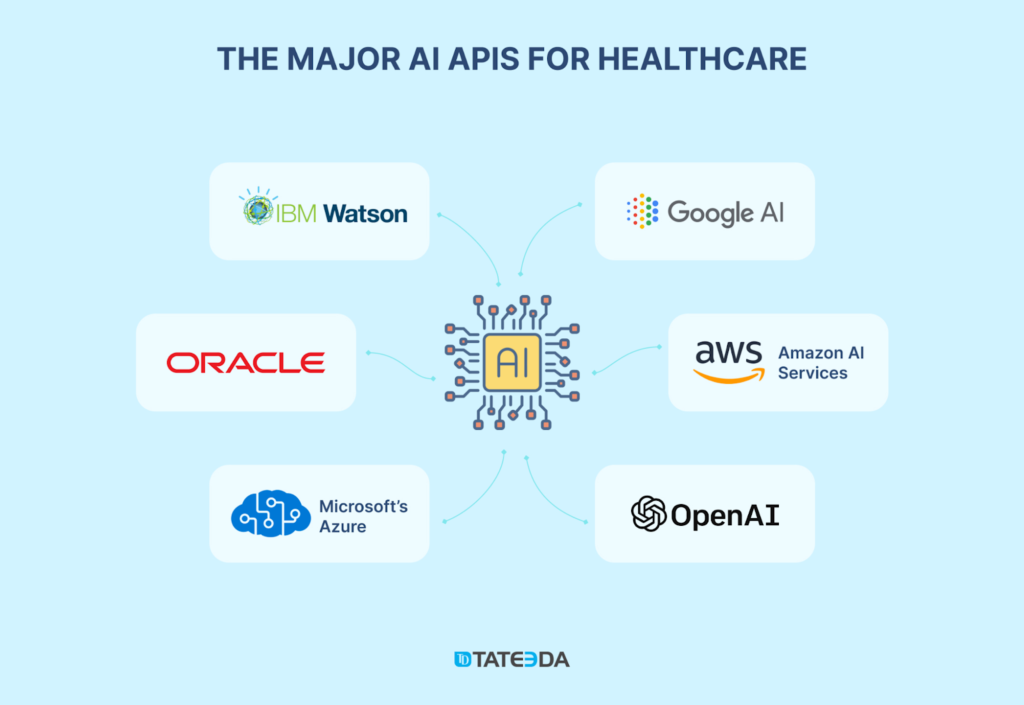
The large vendors mentioned above offer various payment plans, including free offerings, and there are also smaller AI vendors that offer a range of smaller niche services. If you require help with the selection and adoption of one of these AI platforms, schedule a free consultation with our skilled engineers →
Top 5 Use Cases of AI in Healthcare
In this section, we will explore specific AI use cases in healthcare. These examples may sound innovative or even revolutionary, but they are being implemented more and more across a wide range of areas in medical care and business operations. Moreover, these practical applications can be integrated with IT environments as well as systems used in small or medium-sized healthcare practices. If you are considering the adoption of an AI solution in your healthcare facility or company, it is important to carefully study each of the following uses of AI in the medical field.
Use Case #1: Conversational AI Implementation in Healthcare: Intelligent Chatbots for Customer Care
Conversational AI is one of the uses of AI in healthcare and stands as a prominent breakthrough in healthcare technology. Its implementation is notably straightforward, offering ease of use. Moreover, AI-powered chatbots (or voice assistants) have been proven highly efficient in healthcare workflows, streamlining processes like these:
- Patient consultations and responses to frequently asked questions (FAQs) with the ability to answer sub-questions or offer additional information.
- Online symptom-checking dialogue with preliminary anamnesis-based diagnostics plus the ability to schedule a visit with the appropriate physician or medical specialist.
- Voice-enabled health assistants for tasks such as medication-tracking apps and supportive telehealth systems for elderly patients.
- Post-treatment care and monitoring of treatment plan execution.
- Internal communication and staff coordination in hospitals and healthcare teams, including travel nurse agencies and medical staffing marketplaces.
AI chatbots can serve multiple patients simultaneously, surpassing the capacity of one or even several administrative employees. This not only improves efficiency but also saves valuable working hours for human staff members.
The traditional question here is as follows: Why should we implement AI when we can create a simple bot following scripted scenarios? Let’s find out the answer…
| ❓ Conversational AI vs. Scripted Chatbots: Understanding the Distinction It is crucial to differentiate conversational AI chatbots from programmed chatbots. Though the terms “chatbot,” “virtual assistant,” and “conversational AI” are often used interchangeably, they do not hold the same meaning. While usual chatbots automate conversations through logically organized dialog scripts and are limited to predefined rules, conversational AI goes beyond those limitations. In general, chatbots are applications designed to facilitate automated dialogs, in which users can ask questions (or select predefined questions, answers, options, etc.) and receive instant replies without human intervention. However, not all chatbots incorporate artificial intelligence, which is why they are not capable of engaging in organic conversations. |
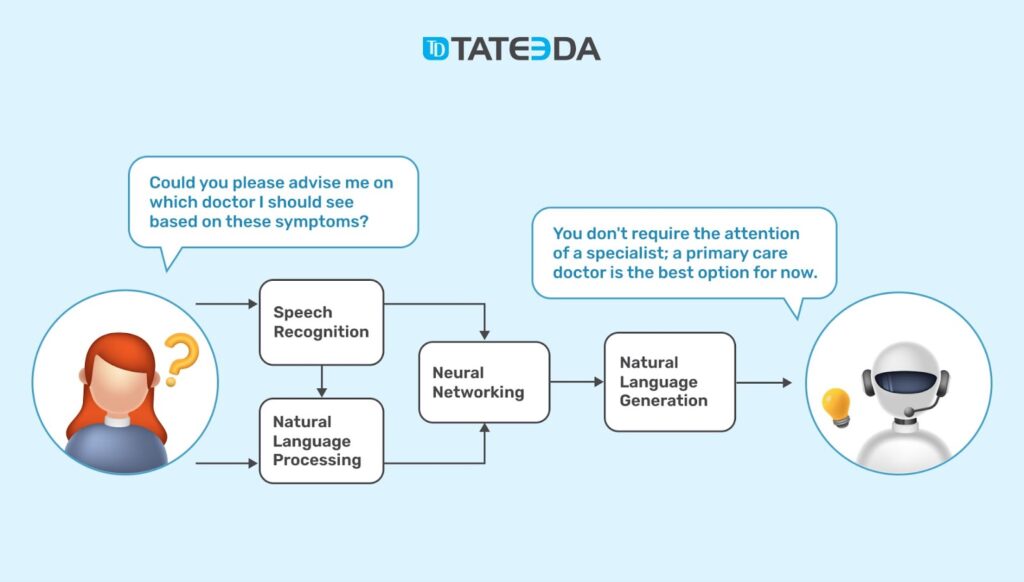
Learn more: ➡️ Patient Portal Development Services
Many chatbots rely on scripted responses and rule-based programming, limiting their capabilities to providing simple answers to specific questions. In contrast, conversational AI delivers more advanced and natural interactions.
By leveraging…
- Machine-learning algorithms,
- Natural language processing, and
- Contextual understanding,
…conversational AI systems in healthcare can engage in sophisticated conversations with unpredictable plots that closely resemble human interactions. They can cover a wide range of topics, handle assorted questions, and adapt to different linguistic levels or styles. This is particularly valuable in healthcare, as not all potential patients in the United States are native English speakers or possess sufficient English language skills.
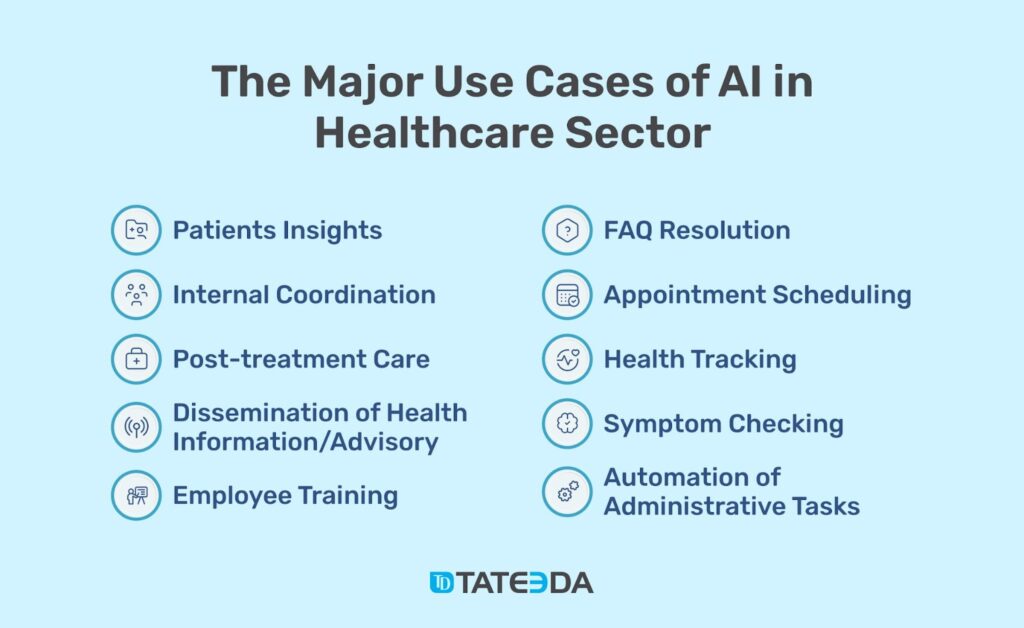
Learn more: ➡️ Top 10+ Healthcare Mobile App Trends Shaping the Industry
AI Use Case in Healthcare #2: Symptom-checking Virtual Assistants vs. Generic Internet Research
Symptom-checking and medical triaging can be effectively facilitated through the use of conversational AI. When individuals experience symptoms such as persistent headaches or body aches along with various other health concerns, they often turn to the internet for information. However, generic search results may leave them feeling concerned or unsure about the cause of their symptoms. There is even a specific term called Cyberchondria syndrome that refers to health concerns and compulsive behaviors triggered by excessive searching for symptoms and potential diseases/disorders on the internet.
In contrast, conversational AI systems provide personalized advice and guidance tailored to their specific situation. These systems offer not only medical support but also psychological support, using a friendly and professional tone of voice that helps alleviate anxiety in patients.
By leveraging conversational AI, individuals can undergo a thorough diagnosis process by engaging in a step-by-step dialogue and responding to targeted questions about their symptoms. This logical sequence ensures a more accurate understanding of their condition and assists in determining the appropriate level of care needed. While some symptoms may indicate a serious condition requiring immediate attention, conversational AI can provide quick and precise diagnoses or assist in the scheduling of medical appointments for further evaluation when necessary, as shown in the following screen:
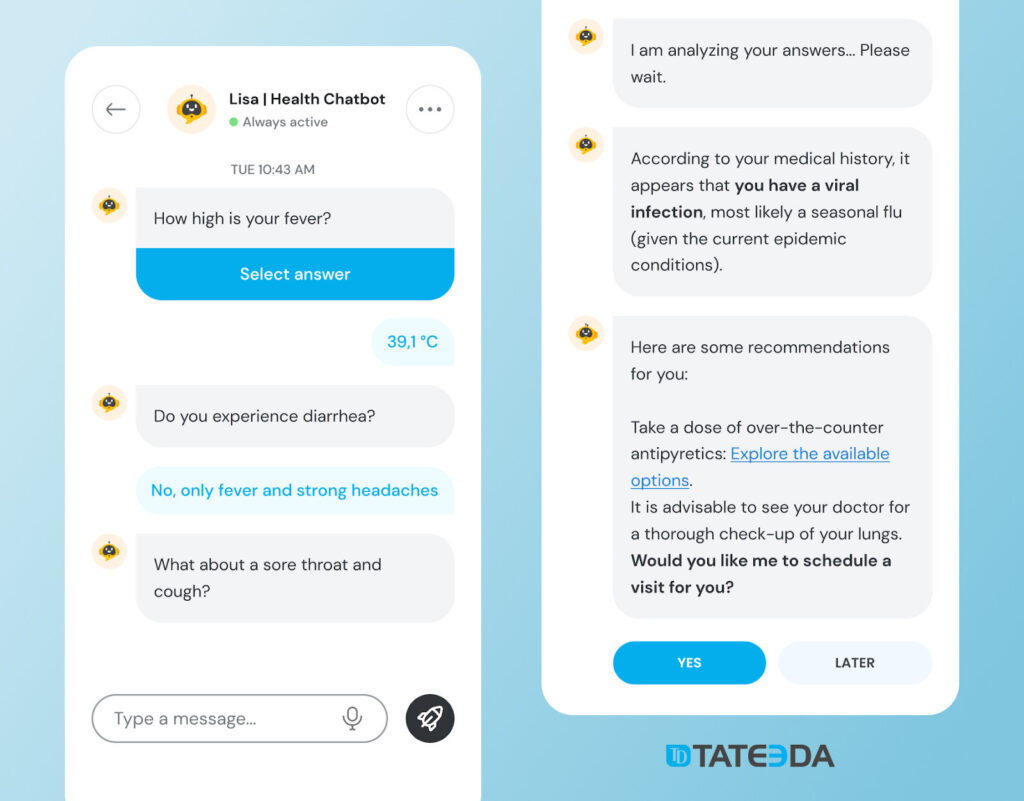
Use Case #3: Information Dissemination via AI Chatbot
The COVID-19 pandemic has served as a stark reminder of a lesson we have always known but often forget: During a healthcare crisis, misinformation and panic spread even faster than infection. However, even under normal circumstances, inaccurate or false information about health and disease can cause harm to individuals and communities, hindering people from making informed decisions or, worse, encouraging them to make incorrect ones. ?
Medical professionals shoulder the responsibility of educating people and countering misinformation, which adds to their workload during challenging periods. Conversational AI can be a valuable tool that automates various medical PR tasks, sparing healthcare specialists from repetitive patient communications:
- AI assistants can raise awareness about health concerns and crises.
- AI can provide quick access to accurate and reliable information.
- Conversational AI can be deployed across digital platforms, including websites, social media, and messaging apps, ensuring widespread access to verified, essential information.
Use Case #4: Health Coaching, Tracking, and Management
Unless you’re a millionaire, it’s nearly impossible to have a personal healthcare team consisting of a nutritionist, nurse, health advisor, and coach available 24/7 to supervise and guide you in the maintenance of a healthy lifestyle and appropriate medical decision-making. However, conversational AI has transformed patient care by providing individuals with the power to proactively manage their physical well-being as if they had a dedicated team of professional health management specialists right by their side.
Through early symptom identification and online consultations using an AI-driven assistant with an up-to-date healthcare knowledge base, patients can effectively monitor their health status and seek timely medical and wellness advice. Additionally, patients now have access to a wealth of tools and information at their fingertips, empowering them to take charge of their own healthcare journey. They can effortlessly track vital health metrics, manage medication schedules, and receive personalized tips and guidance for maintaining a healthy lifestyle that includes weight control, exercise, nutrition, mental health, and more.
| What do you think about these AI in healthcare use cases? TATEEDA GLOBAL is a health-tech system development company. We have the skills to assist you with the implementation of AI-based packages or features within your healthcare software. Whether it’s enhancing your websites, mobile apps, or desktop platforms, we have the expertise to integrate AI seamlessly. Additionally, our team can provide IT consulting services for cloud and IoT solutions, ensuring that your healthcare systems are optimized for the latest telehealth technologies. Discover the range of nearshore software development services we offer and explore how we can support your organization in leveraging AI for improved healthcare delivery: |
Custom Healthcare Solutions
See how we can engineer healthcare software, validate your ideas, and manage project costs for you.
Use Case #5: Streamlining Administrative Tasks through Automation
In healthcare facilities, numerous administrative tasks are performed regularly, often with inefficiencies and challenges. For instance, medical staff members face the burden of searching for patient forms and navigating multiple applications, resulting in wasted time and increased frustration or confusion. Implementing an intelligent AI-based platform can significantly improve the following processes:
- Documentation and data management: Medical staff can use AI-powered voice recognition technology to dictate patient notes, update medical records, and input data into electronic health record (EHR) systems. This streamlines the documentation process, reduces manual data entry, and improves accuracy, as AI can suggest corrections or auto-populate relevant fields based on context and historical data.
- Searching and retrieving information: With AI, staff can use natural language processing to search for specific patient information or medical literature within databases. They can simply speak or type their queries, and AI systems will quickly retrieve relevant data, saving time and effort.
- Appointment scheduling and management: AI-based virtual assistants can handle appointment scheduling tasks, allowing admin staff to delegate these responsibilities. Staff members can interact with the virtual assistant through voice or text commands, providing details such as patient preferences, availability, and required services, and the AI system can efficiently manage the scheduling process from that point forward.
- Patient triaging and routing: AI-powered chatbots can assist with patient triage, capture of initial symptoms, and guidance of patients to the appropriate department and/or healthcare professional. Staff members can communicate with the chatbot using voice or text, allowing for a seamless and efficient patient triage process.
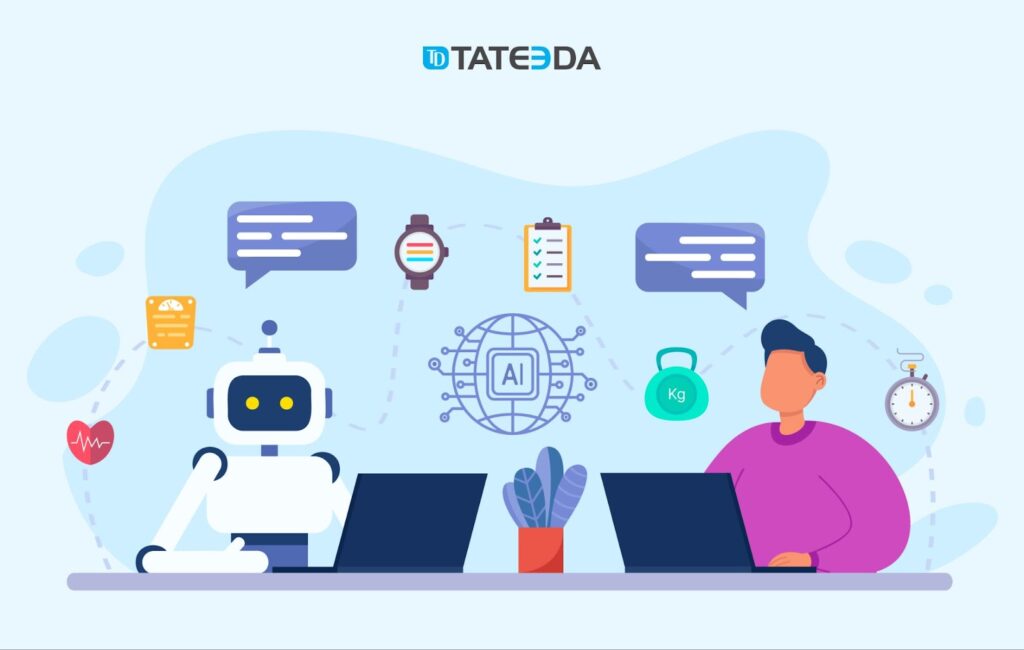
Learn more: ➡️ Custom Healthcare Billing System Development Services
How to Implement AI Platforms into Healthcare Software, Websites, and Systems
After learning about the examples of AI in the medical field, it’s time to learn how to implement AI platforms into healthcare software. The integration of AI technology offers unprecedented opportunities for improved diagnostics, personalized treatments, and enhanced operational efficiency.
In the previous section we gave examples of AI technology in healthcare, now in the next section, we will delve into the practical steps and considerations involved in implementing AI solutions within the healthcare industry, paving the way for a future where intelligent systems work hand in hand with medical professionals to deliver optimal outcomes for patients.
API Integrations
To enable AI functionalities, it is crucial to integrate user-friendly, high-level APIs into existing healthcare software systems. APIs act as bridges between different components, enabling seamless communication and data exchange.
By selecting robust APIs, healthcare organizations can leverage AI-powered functionalities without disrupting their existing infrastructure. In this case, it’s necessary to prepare healthcare software by adding new back-end mechanisms and user interfaces.
Select the Right AI Platform
Choosing the right AI platform is a critical decision that can impact the success of implementation. Working with experienced engineers such as those at TATEEDA GLOBAL can significantly assist in the navigation of this process. TATEEDA’s remote dedicated team of software experts can help evaluate different AI platforms, considering factors like compatibility, scalability, and security. They can also provide insights on selecting AI models that align with specific healthcare needs.
Partner with Skilled Tech Experts
Collaborating with skilled tech partners is essential for a smooth and successful AI implementation. TATEEDA GLOBAL offers comprehensive healthcare IT consulting services, ensuring that healthcare organizations receive expert guidance throughout the process. Our team can assess existing infrastructure, identify areas for improvement, and develop a customized roadmap for AI integration.
Technical Steps for AI Implementation in Healthcare
- Data Preparation: Begin by gathering relevant healthcare data such as patient records, medical imaging, and/or clinical trial data. Ensure the data is properly cleaned, anonymized, and securely stored, complying with privacy regulations like HIPAA.
- AI Model Selection: Identify specific healthcare use cases where AI can add value: precise, automated diagnosis, automated laboratory research management systems, and patient monitoring. Choose appropriate AI models that are well-suited to these use cases such as deep learning algorithms for image analysis and predictive analytical models for health risk assessment (this can be a helpful option for custom medical insurance management systems.)
- Model Training: Train the selected AI models using high-quality, labeled healthcare datasets. This process involves feeding the model with diverse examples, allowing it to learn patterns and make accurate predictions. Collaborate with domain experts such as physicians or medical researchers to ensure that models are trained with expert knowledge.
- Integration and Testing: Integrate AI components into the existing healthcare software systems, websites, and applications. Conduct rigorous testing to validate the performance, accuracy, and reliability of the AI algorithms. This includes simulated testing, real-world testing with sample data, and gathering feedback from healthcare professionals.
- Deployment and Monitoring: Deploy the AI-powered solution in the healthcare environment, ensuring seamless integration with existing workflows and systems. Continuously monitor the performance of the AI models and gather feedback from users. Implement mechanisms to capture and analyze real-time data to monitor the effectiveness and impact of the AI solution on patient outcomes and operational efficiency.
Delivered Healthcare Software Portfolio
The leading American healthcare companies benefit from working with us.
The Future of AI in Healthcare
According to recent health-tech trends, the potential of AI in healthcare is vast, and its future implications are genuinely transformative. Here are some predictions for the future of AI in healthcare:
- Personalized treatment for everyone: AI will enable the development of highly personalized treatment plans tailored to each patient’s unique genetic makeup, lifestyle, and medical history. Thanks to the remarkable productivity specific to AI technologies, a personalized approach to healthcare is becoming accessible to patients across all income levels. This represents a significant shift, as previously, personalized care seemed unimaginable.
- Augmented decision-making: AI will act as a powerful decision-support tool, providing healthcare professionals with real-time insights, evidence-based recommendations, and predictive analytics to enhance clinical decision-making. This involves automated medical data mining and health data visualization.
- Telehealth and remote care: AI-powered technologies will further enhance remote healthcare delivery by enabling virtual consultations, remote monitoring, and advanced AI-aided diagnostic capabilities. With the assistance of telehealth AI, patients can gain access to 3D-rendered virtual physicians driven by AI simulations. This enables them to receive prompt consultations with fewer constraints and limitations as a part of traditional clinical and healthcare routines.
- Genomic medical advancements: AI will play a crucial role in unlocking the potential of genomic medicine by analyzing complex genetic data, identifying disease markers, and facilitating targeted therapies.
Let’s Build Health-Tech Solutions Together
Since 2013, we have been helping American healthcare companies develop their IT solutions.
FAQ: Artificial Intelligence Use Cases in Healthcare
How does AI ensure patient data privacy and security?
AI applications in healthcare adhere to strict privacy regulations and employ robust security measures, including encryption, access controls, and anonymization techniques to protect patient data.
Can AI replace healthcare professionals?
AI is designed to augment healthcare professionals rather than replace them. It serves as a valuable tool for decision support, data analysis, and improvement of efficiency, enabling healthcare professionals to concentrate on providing optimal patient care. In essence, AI empowers physicians to increase productivity and attend to a higher number of patients while maintaining objectivity and quality of care. By leveraging AI technology, healthcare professionals can enhance their abilities and make more informed decisions, ultimately benefiting both medical practitioners and the patients they serve. For example, AI-aided software components can be integrated into custom medical HR management systems to facilitate and support personnel inquiries, reassignments, and other routine tasks.
How can AI improve healthcare accessibility in underserved areas?
AI-powered telehealth solutions can bridge the gap between patients and healthcare providers in remote or underserved areas by enabling virtual consultations, remote monitoring, and timely interventions.
What challenges are associated with the implementation of AI in healthcare?
Challenges include data quality and medical system interoperability, ethical considerations, regulatory compliance, integration with existing systems, and ensuring the transparency and explainability of AI algorithms.









